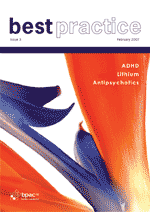| Primary care plays a key role in the management of ADHD |
Select |
Although the diagnosis and management of ADHD is primarily the
responsibility of specialist multidisciplinary teams, primary care
clinicians play important roles in improving outcomes for people
with ADHD.
These roles include: making a provisional diagnosis and referring
appropriately, assisting patients and their families to reach decisions
on management options, facilitating and encouraging adherence to
treatment regimens, monitoring for adverse effects and response
to treatment, and discussing the future.
|
 |
| Monitoring for metabolic disorders in patients taking antipsychotic drugs |
Select |
| Individuals with serious mental illness have markedly increased rates
of metabolic disturbances, including obesity, diabetes and lipid
disorders. Treatment with antipsychotics can contribute to these
problems along with lifestyle issues associated with severe illness.
Concurrent medical illness is also common in this group, leading to
increased morbidity and mortality particularly due to cardiovascular
disease. The GP plays a key role in a multidisciplinary approach to
patient management by ensuring on-going monitoring and advice to
improve health outcomes. Many people taking antipsychotic drugs
in the community will see their GP regularly in between specialist
visits. |
 |
| Lithium in General Practice |
Select |
| Lithium remains a mainstay of treatment for bipolar disorder but
dose individualisation, measurement of serum drug concentrations
and monitoring for adverse reactions are vital in order to maximise
therapeutic response. Lithium has a narrow therapeutic index. Drug
interactions, changes in diet and fluid intake, illness and compliance can
all markedly affect serum drug concentrations, reducing therapeutic
response or causing toxicity. In most cases lithium will be started by a
specialist but the General Practitioner has an important role to play to
ensure optimal management. |
 |
| Essentials |
Select |
|
|
 |





